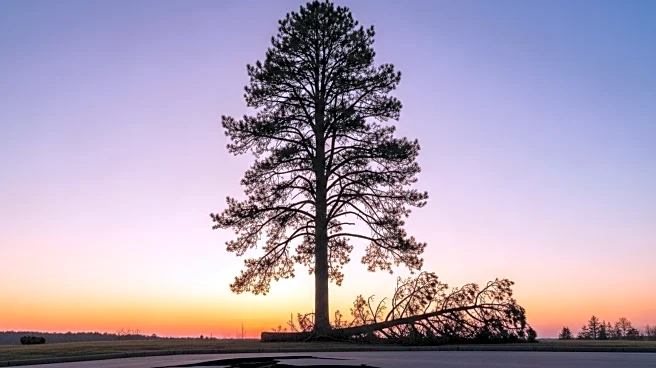What is the story about?
What's Happening?
Brian Nunan, a resident of Tilehurst, has appealed to have a century-old Monterey Pine tree removed after West Berkshire Council denied his request. Nunan claims the tree has caused damage to his car and property, citing falling cones and branches, particularly after storm Eunice in February 2022. The council argues the tree is a significant feature of the urban landscape, contributing to the area's verdant character. The tree officer noted that bird excrement, a nuisance cited by Nunan, is not a valid reason for removal. The tree is part of a preservation order from 1966, with only 30 of the original 130 pines remaining. Nunan's appeal includes evidence of damage and increased insurance premiums, but the council maintains the tree's removal would harm the area's character.
Why It's Important?
The case highlights the tension between individual property rights and community environmental preservation. Removing the tree could set a precedent for similar cases, potentially impacting urban green spaces. The council's decision reflects broader conservation efforts to maintain biodiversity and urban aesthetics. The outcome could influence local policy on tree preservation and property damage claims, affecting residents and environmental stakeholders. The appeal underscores the challenges in balancing ecological value with personal inconvenience, a common issue in urban planning.
What's Next?
The government planning inspector will decide on the appeal, considering the tree's amenity value and the potential precedent its removal could set. If the appeal is successful, it may lead to increased requests for tree removals, prompting a review of preservation policies. The decision could also affect Nunan's insurance claims and property maintenance strategies. Local environmental groups may respond, advocating for stricter preservation measures. The case may influence future council decisions on similar issues, impacting urban planning and community relations.
Beyond the Headlines
The appeal raises ethical questions about the value of natural features versus human convenience. It highlights the role of trees in urban ecosystems, providing habitat for wildlife and contributing to air quality. The case may prompt discussions on alternative solutions, such as protective measures for property without removing trees. It also reflects broader societal debates on environmental responsibility and the rights of individuals versus community interests.















